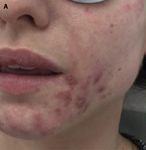Dermatology Practical & Conceptual - Ablative Fractional Erbium:YAG Laser Resurfacing: A Treatment Option for Acne
←
→
Page content transcription
If your browser does not render page correctly, please read the page content below
Dermatology Practical & Conceptual
Ablative Fractional Erbium:YAG Laser Resurfacing:
A Treatment Option for Acne
Stefania Guida1, Nicola Lippolis1, Matteo Giovani1, Gioia Pedroni1, Giacomo Giovanni
Urtis2, Giovanni Pellacani1,3, Francesca Farnetani1, Marco Manfredini1
1 Dermatology Unit, Department of Surgical, Medical, Dental and Morphological Science with Interest Transplant, Oncological and
Regenerative Medicine, University of Modena and Reggio Emilia, Modena, Italy
2 Cliniche Diventa, Milano-Roma-Como, Italy
3 Dermatology Clinic, Department of Clinical Internal, Anesthesiological and Cardiovascular Sciences, Sapienza University of Rome,
Rome, Italy
Key words: acne, laser, erbium:YAG, active acne
Citation: Guida S, Lippolis N, Giovani M, et al. Ablative fractional erbium:yag laser resurfacing: a treatment option for acne.
Dermatol Pract Concept. 2022;12(1):e2022024. DOI: https://doi.org/10.5826/dpc.1201a24
Accepted: May 26, 2021; Published: January 2022
Copyright: ©2022 Guida et al. This is an open-access article distributed under the terms of the Creative Commons
Attribution-NonCommercial License (BY-NC-4.0), https://creativecommons.org/licenses/by-nc/4.0/, which permits unrestricted
noncommercial use, distribution, and reproduction in any medium, provided the original authors and source are credited.
Funding: None.
Competing interests: None.
Authorship: All authors have contributed significantly to this publication.
Corresponding author: Dr Nicola Lippolis, Dermatology Unit, Department of Surgical, Medical, Dental and Morphological Science with
Interest Transplant, Oncological and Regenerative Medicine, University of Modena and Reggio Emilia, Modena, Italy.
E-mail: lippolisnicola@yahoo.it
Introduction patients gave informed consent to mild laser rejuvenation
therapy with ablative fractionated erbium:YAG laser, (Xlase
Acne vulgaris is a disease of the pilosebaceous unit, charac- plus; Biotec Italia srl, Dueville, VI).
terized by a hyper keratinization process, comedo formation, These patients were treated using the standard protocol
and inflammatory reactions [1]. The use of lasers for the for mild resurfacing and rejuvenation. Employed parameters
treatment of acne has been described, but the role of resur- were 1.5 ms, 3.5 mJ/cm2, 5 Hz on the cheeks and the chin,
facing lasers for active acne has not been clarified yet. and the rest of the face was treated with 1.0 ms, 2.8 mJ/cm2,
6 Hz. One laser session per month for 3 months was per-
formed for each patient. Overlapping pulses were performed
Case Presentation
over inflammatory lesions. After the laser sessions, the pa-
We present the cases of 3 women with noninflammatory tients were instructed to apply sunscreen SPF 50+ and a
and inflammatory acne lesions. They received laser therapy hydrating cream for 30 days. All 3 patients tolerated the
because they refused prolonged topical treatments or other treatment without any reported side effects. They showed a
systemic acne therapies. No treatment was given to the pa- visible improvement of the skin texture and a reduction of
tients in the previous 6 months prior to laser treatment. The active acne.
Research Letter | Dermatol Pract Concept. 2022;12(1):e2022024 1The average value for the Investigator Global Assessment The short follow-up period of our patients represents
scale (IGA) was indicative of a mild-moderate acne at base- a limitation of this case report. Further studies are needed
line (IGA 1-2) and decreased consistently to the almost-clear to investigate the anti-acne effect of erbium: YAG laser and
stage (IGA 0-1) at the last follow-up visit 3 months after the its mechanism of action with respect to comedogenesis and
last laser session (Figures 1 and 2). inflammation.
One paper describes the application of multiple sessions
of erbium:YAG laser treatment for active acne on 2 patients
Conclusions
with inflamed cystic acne [2]. Singh et al hypothesized that
the mechanism of action of this laser source might be related Acne is one of the most common skin diseases. Many ther-
to the photothermal effect acting on follicular hyperkeratosis apeutic approaches are currently available for active acne,
and contributing to skin microbe modulation. including laser treatments. However, the role of resurfacing
Figure 1. Clinical pictures of a 34-year-old woman. (A) Before the last erbium:YAG laser session. (B) 3 months after the last
erbium:YAG laser session, showing the reduction of active acne lesions.
Figure 2. Clinical pictures of a 25-year-old woman. (A) Before the last erbium:YAG laser session. (B) 3 months after the
last erbium:YAG laser session, highlighting a consistent reduction of both inflammatory and noninflammatory acne skin
lesions.
2 Research Letter | Dermatol Pract Concept. 2022;12(1):e2022024with erbium:YAG laser has not been clarified yet. Results References
from clinical practice, such as in the cases presented herein,
highlight the importance of further investigations in 1. Manfredini M, Greco M, Farnetani F, et al. In vivo monitoring
of topical therapy for acne with reflectance confocal microscopy.
this field.
Skin Res Technol. 2017;23:36–40. DOI: 10.1111/srt.12298.
Informed consent: Written informed consent for publication PMID: 27273850.
2. Singh MZ, Singh SI, Basra PS. Erbium:YAG laser resurfacing
of their clinical details and clinical images was obtained from
in patients with inflamed cystic acne. J Cosmet Laser Ther.
all patients.
2006;8(4):163-166. DOI: 10.1080/14764170601034711. PMID:
19839167.
Research Letter | Dermatol Pract Concept. 2022;12(1):e2022024 3You can also read





















































